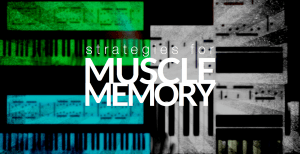Muscle memory strategies for keyboard players

In order to express your yourself on keyboard, you have to put some of your technique on automatic. That’s why muscle memory is so important.
Muscle memory allows you to shift your focus away from every individual note and finger motion and toward other things like adjusting your sounds, your vocal, leading others, or (especially) worshiping!
Here are some strategies for maximizing your muscle memory on piano.
The power of repetition (the power of repetition, the power of…)
Your brain can know exactly what you need to do, but until you have completed enough repetitions, your fingers won’t. Take short sections of your music and repeat them until automatic. Don’t be afraid to play something 50-100 times.
Slow down and focus on technique
The quantity of repetitions only counts if you also play with quality technique. Everything you play teaches your muscles something, good or bad. Practice with only good technique, and slow down to make sure this happens.
Include all aspects of needed technique
Don’t just practice the easy stuff. Be thorough in building muscle memory for every technique you will need. For example, take the time to learn every inversion of every chord. Practice chord exercises until your fingers can quickly and accurately find the chord you need every time.
Connect your ears to your muscle memory
You want your brain and fingers connection to also be wired to your ears. To accomplish this, take the simple step of considering the key of the song or exercise and how the notes and chords align with the key’s scale. As you build your muscle memory, you will also develop your ears to hear how the different chords and scale notes function – necessary skills for playing by ear and improvising melodies.
Sleep
That’s right! Your muscle memory isn’t complete until you’ve slept on it. Sleep time is when the brain consolidates motor learning and what you’ve practiced becomes hardwired as a long-term skill.
Exercises to develop your muscle memory
Both Fluent Piano courses – Chords and Melodic – offer exercises to build not only your finger strength and coordination, but also muscle memory and ear training. Click here to discover which course is right for you.
Happy practicing!

